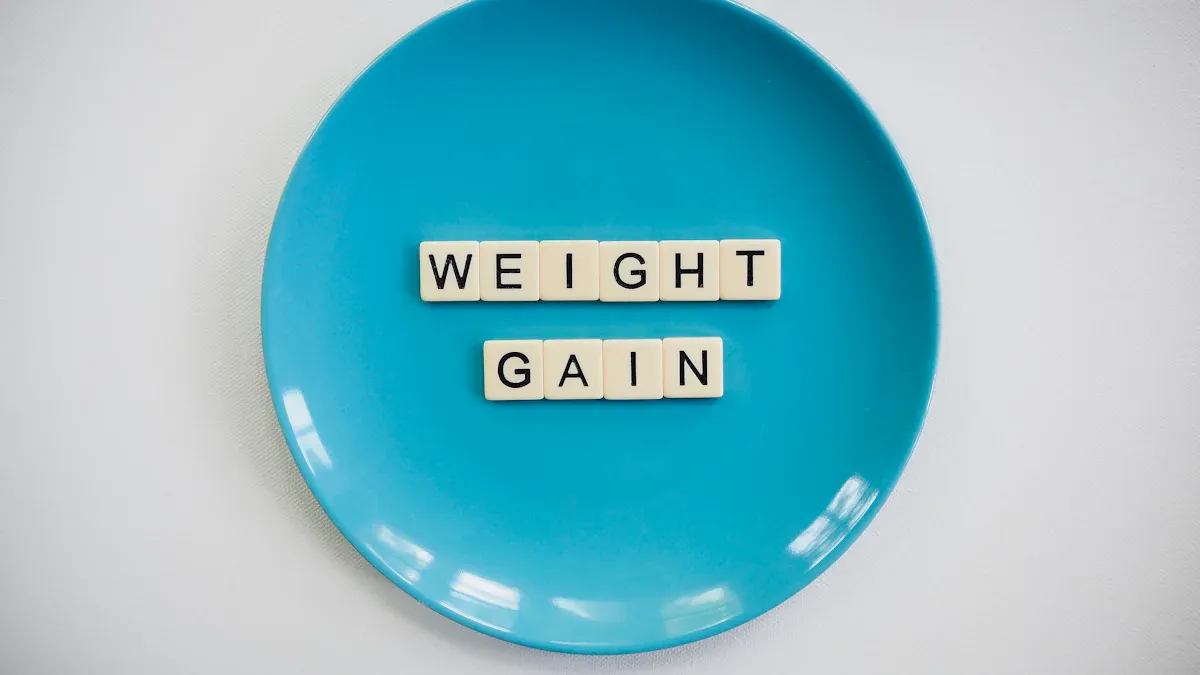
Our weight gain calculator gives you an easy way to set and track your weight gain goals. You can use a weight gain calculator anywhere, anytime, which makes it simple to stay on top of your progress. This tool estimates your calorie needs and shows you how much to eat each day. Our weight gain calculator also tracks your results and shows how long it might take to reach your target. Some weight gain calculator options work for special needs, like during pregnancy.
Now, check out your exact weight gain using our weight gain calculator.
What Is a Weight Gain Calculator?

Purpose and Benefits
A weight gain calculator is a tool that helps you figure out how many calories you need each day to reach your weight gain goals. You enter your details, and the calculator does the math for you. It looks at things like your age, height, weight, and activity level. Then, it tells you how much you should eat to gain weight in a healthy way.
You get a clear plan. The calculator shows you how many extra calories you need each day. It can also give you an idea of how long it might take to reach your target weight. Some calculators even let you track your progress over time. This makes it easier to stay motivated and see how far you have come.
Using our calculator saves you time and removes the guesswork. You do not have to worry about making mistakes with your math. You can focus on eating well and following your plan.
Who Should Use Our Weight Gain Calculator
If you want to gain weight for sports, health, or personal reasons, this tool can help. People who are underweight or have trouble gaining weight often use these calculators. Athletes who want to build muscle also find them useful.
Pregnant people may use a special calculator to make sure they gain the right amount of weight for a healthy pregnancy. If you have a medical condition that affects your weight, a calculator can help you set safe and realistic goals.
A weight gain calculator is for anyone who wants a simple way to plan and track their progress. You get a step-by-step guide to reach your goals.
How to Use Our Weight Gain Calculator
Entering Details
When you start with our weight gain calculator, you first enter your personal details. This step helps the calculator figure out your daily calorie requirements. You need to type in your gender, age, height, and current weight. These details matter because everyone’s body works a little differently.
You also pick your activity level. Are you mostly sitting during the day, or do you move around a lot? The calculator uses this information to estimate how many calories you burn. If you want to reach your weight gain goal, you need to know how many calories you use every day.
Tip: Be honest about your activity level. If you guess, the calculator might not give you the right numbers.
Setting a Weight Gain Goal
Next, you set your weight gain goal. This is the amount of weight you want to add to your body. You can choose a number that feels right for you. Some people want to gain a few pounds. Others want to reach a desired body weight for sports or health reasons.
The calculator will ask you how fast you want to gain weight. Do you want to go slow and steady, or do you want to see results faster? Most experts say slow and steady is best for healthy bulking. The calculator uses your answers to show you how many extra calories you need each day. This number is your daily caloric intake for bulking.
Our weight gain calculator provides precise results based on the data you input.
Example:
Suppose you’re a 30-year-old male, 170 cm tall, weighing 80 kg, and leading a sedentary lifestyle with minimal physical activity. The calculator may estimate your Basal Metabolic Rate (BMR) to be approximately 20302 calories per day.
If you’re aiming to reach 85 kg, with a goal of gaining 1 kg per week, You need to consume 20302 calories or 20.3Kcal per day to reach your target weight.
This is just a sample scenario. Be sure to follow the specific guidelines tailored to your body type and pursue a healthy approach to weight gain.
Here’s a simple table to show what you might enter:
Detail | Example Entry |
|---|---|
Gender | Male or Female |
Age | 30 ( Male) |
Height | 170cm |
Current Weight | 80Kg |
Activity Level | Moderate |
Weight Gain Goal | 85Kg |
Using a Bulking Calculator
A bulking calculator is a special kind of weight gain calculator. It helps you plan your bulking journey step by step. You use it to figure out your daily caloric intake and how long it will take to reach your weight gain goal. The bulking calculator looks at your personal details and your weight gain goal. Then, it tells you how many calories you need to eat each day to start bulking.
You can use a bulking calculator to track your progress. If you want to build muscle, this tool is perfect for you. Bulking is not just about eating more food. You need to eat the right foods and watch your daily calorie requirements. The bulking calculator helps you stay on track and avoid gaining too much fat.
Note: Bulking works best when you check your progress often. If you are not gaining weight, you may need to adjust your daily caloric intake.
Many athletes use a bulking calculator to plan their meals. You can use it to see how long it will take to reach your weight gain goal. Bulking calculators make it easy to see if you are on the right path. You can use a bulking calculator as often as you want. If your activity level changes, update your details and check your new numbers.
Bulking is a process. You need to be patient and stick to your plan. A bulking calculator gives you the numbers you need to reach your weight gain goal. If you want to build muscle and reach your goals, a bulking calculator is your best friend.
Interpreting Our Calculator Results
When you use our weight gain calculator, you see a lot of numbers and terms. You might wonder what they all mean. Let’s break down what you see and what you should do with this information.
BMR and TDEE
BMR stands for Basal Metabolic Rate. This number shows how many calories your body burns when you rest. You use energy even when you sleep or sit still. Your BMR depends on your age, gender, height, and weight.
TDEE means Total Daily Energy Expenditure. This number tells you how many calories you burn in a whole day. It includes your BMR plus the calories you burn from moving, walking, and doing activities.
Here’s a quick look at what these numbers mean:
Term | What It Means | Why It Matters |
|---|---|---|
BMR | Calories burned at rest | Shows your base energy needs |
TDEE | Calories burned in a day | Helps you set your daily caloric intake |
You use your TDEE to figure out how much you need to eat. If you want to gain weight, you need to eat more than your TDEE.
Calorie Surplus
A calorie surplus means you eat more calories than your body burns. This is the key to gaining weight. The calculator shows you how many extra calories you need each day. This number is your caloric surplus.
You might see a tool called a calorie surplus calculator. This tool helps you find the right amount of extra calories to add to your daily caloric intake. If you eat too few extra calories, you may not gain weight. If you eat too many, you might gain fat instead of muscle.
Tip: Try to get your caloric surplus from healthy foods. Choose foods with protein, healthy fats, and good carbs. This helps you gain weight in a healthy way.
Timeline to Weight Gain Goal
The calculator also gives you a timeline. This shows how long it might take to reach your weight gain goal. The timeline depends on your caloric intake and your caloric surplus. If you eat more extra calories, you may reach your goal faster. If you go slow, it may take longer, but it is often healthier.
You can use this timeline to plan your meals and track your progress. If you do not see the results you want, you can adjust your caloric intake. Check your weight every week. If you are not gaining as planned, add a small amount to your daily calories.
Note: Your body can change over time. If you start moving more or less, update your details in the calculator. This keeps your plan on track.
What should you do with these results?
Use your BMR and TDEE to set your starting point.
Follow the suggested caloric intake to reach your goal.
Watch your progress and adjust if needed.
Stay patient and keep checking your numbers.
You now know what each result means and how to use them. This helps you make smart choices and reach your weight gain goal in a healthy way.
Healthy Weight Gain Tips

Nutrition for Weight Gain
What should you eat for healthy weight gain? Start with nutrient-dense foods. These foods give you more vitamins and minerals in every bite. Choose foods like nuts, seeds, whole grains, and avocados. Add more protein to your meals. Protein helps your body build muscle and repair tissue. Try eggs, chicken, fish, beans, and dairy products. You also need healthy fats. Fats give you energy and help your body use vitamins. Drink milk or smoothies with nut butter for extra calories.
Tip: Plan your meals and snacks. Eat every three to four hours. This helps you get enough nutrition each day.
Building Muscle vs. Fat
What happens when you gain weight? You can gain muscle, fat, or both. If you want to build muscle, focus on protein and strength-training exercises. Protein gives your muscles what they need to grow. Strength-training exercises, like lifting weights or using resistance bands, help you build muscle instead of just adding fat. Make sure you exercise regularly. This keeps your body strong and supports your weight gain program.
Note: Track your progress. Use a journal or app to see changes in your body and adjust your plan if needed.
Risks of Being Underweight
What risks come with being underweight? You may feel tired or weak. Your body might not fight off sickness as well. You could have trouble focusing at school or work. Healthy weight gain can help you avoid these problems. Eating enough nutrition and protein supports your immune system and energy levels. If you feel worried about your weight, talk to a doctor or nutrition expert. They can help you find the best plan for you.
You can start your weight gain journey by using our weight gain calculator. First, enter your details and set your goal. Next, follow the daily calorie plan and check your progress each week. Choose healthy foods and make small changes if you need to. If you feel unsure or have questions, talk to a healthcare professional. Remember, slow and steady wins the race!






